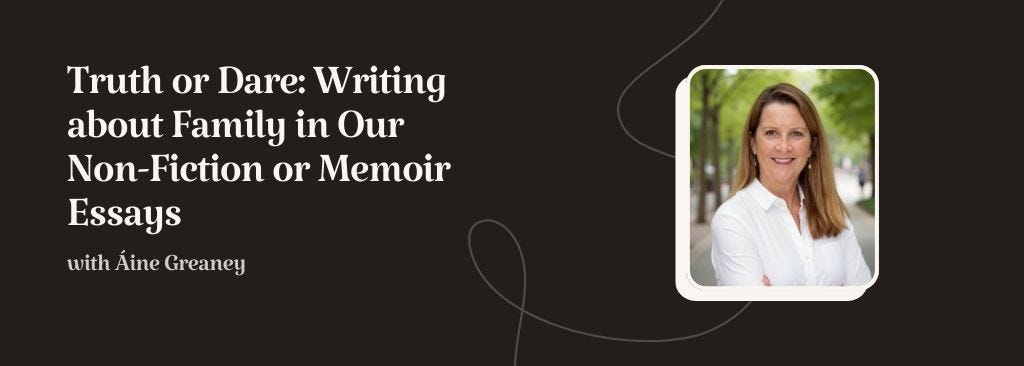Writing About Family
A Q&A with writer Áine Greaney
All of us who write know that writing about family members publicly is not easy.
In our workshops and groups, this is a challenge that is frequently discussed.
That’s why we are grateful that writer and teacher Áine Greaney will be leading a workshop for our HerStories and Midstory community of midlife writers on Thursday, March 27th at 2 p.m. Eastern called “Truth or Dare: Writing about Family in Our Non-Fiction or Memoir Essays.”
An Irish native, Áine Greaney now writes and teaches writing in coastal Massachusetts. In addition to her five published books, her short works have appeared in Creative Nonfiction, Another Chicago Magazine, The Boston Globe Magazine, The New York Times, Books Ireland, WBUR/NPR and many other publications. Greaney is a trained teacher who has designed and led fiction and non-fiction workshops, presentations and keynotes for regional, national and international organizations.
Before her workshop, I reached out to Áine to ask her a few questions about how she became interested in this topic of writing about family, her background, and her writing and teaching life.
JS: What inspired you to want to teach this workshop for us for midlife women about writing about our families?
AG: I think many of us non-fiction (and fiction) authors struggle with how much we should write about our families in our writing. We want to tell the truth, but we also want to be invited back to the Thanksgiving family table. Even when we're writing the truth, we know that our version of a family event is just one version--especially if we have siblings. That said, the beauty of nonfiction writing is that we can be truthful about our own flawed memories--right there on the page.
JS: In the workshop you'll be exploring with us "the three phases" of writing about family. Can you briefly explain the three phrases?
AG: Phase 1 is generative writing. Here we write to discover, to remember, to understand, and refine our writing goal. We have to ask and answer, "Why am I writing this? And, "Why now?"
Phase 2 is re-drafting this generative piece for improved structure, clarity and truth
Phase 3 is editing and deciding what to tell and what to withhold — not just to protect a family member's privacy, but also in service of the narrative and its clarity, power and depth.
JS: You've referred to yourself as an "immigrant writer." Can you explain that and tell us a little bit about your background?
AG: I landed, alone, in the U.S. in the late 1980s. Back then, during high unemployment in my native Ireland, approximately 200,000 young Irish folks left our own country. Some left for employment; others left for personal reasons. Now, all these years later, I know believe that moving countries has informed and defined many things--including how I see the world and write about it.
JS: You have written a lot about writers and well-being, and you published a book Writer with a Day Job related to this topic. What inspires you to be interested in writing and wellness?
AG: As well as creative writing, I've been working for healthcare nonprofits for over 20 years now. Since the age of 14, I had been keeping a journal and knew that this was a way to cope with life changes and challenges. With these two things in my background, I decided to take a number of training courses in expressive writing. During my first course, I felt a true sense of belonging. I've led many workshops in this area. Each time, it's an honor to be with other folks who are willing to explore the power of writing.
JS: What do you love about the teaching of writing?
AG: Oh, where to start? First, I adore the course planning — where I decide what to include in our syllabus and what part to deliver in real time and what part to give as take-home resources. Once the workshop is live, I love the sense of community. I like to hear from participants about their writing lives and experiences. I also love when the participants engage with each other or trade resources. Finally, nothing is as exciting as when you get an after-workshop note from a participant.
JS: Who are your favorite writers?
AG: Oh, I have a few. I'm a long-time fan of Penelope Lively and the late (and great) Bharati Mukherjee. I also like Nicole Dennis-Benn and Jhumpa Lahiri. For non-fiction, I recently read, “Here We Are,” a memoir by Aarti Namdev that I adored. Currently, I'm reading “Bad Indians,” a tribal, mixed-genre memoir by Deborah Miranda.



